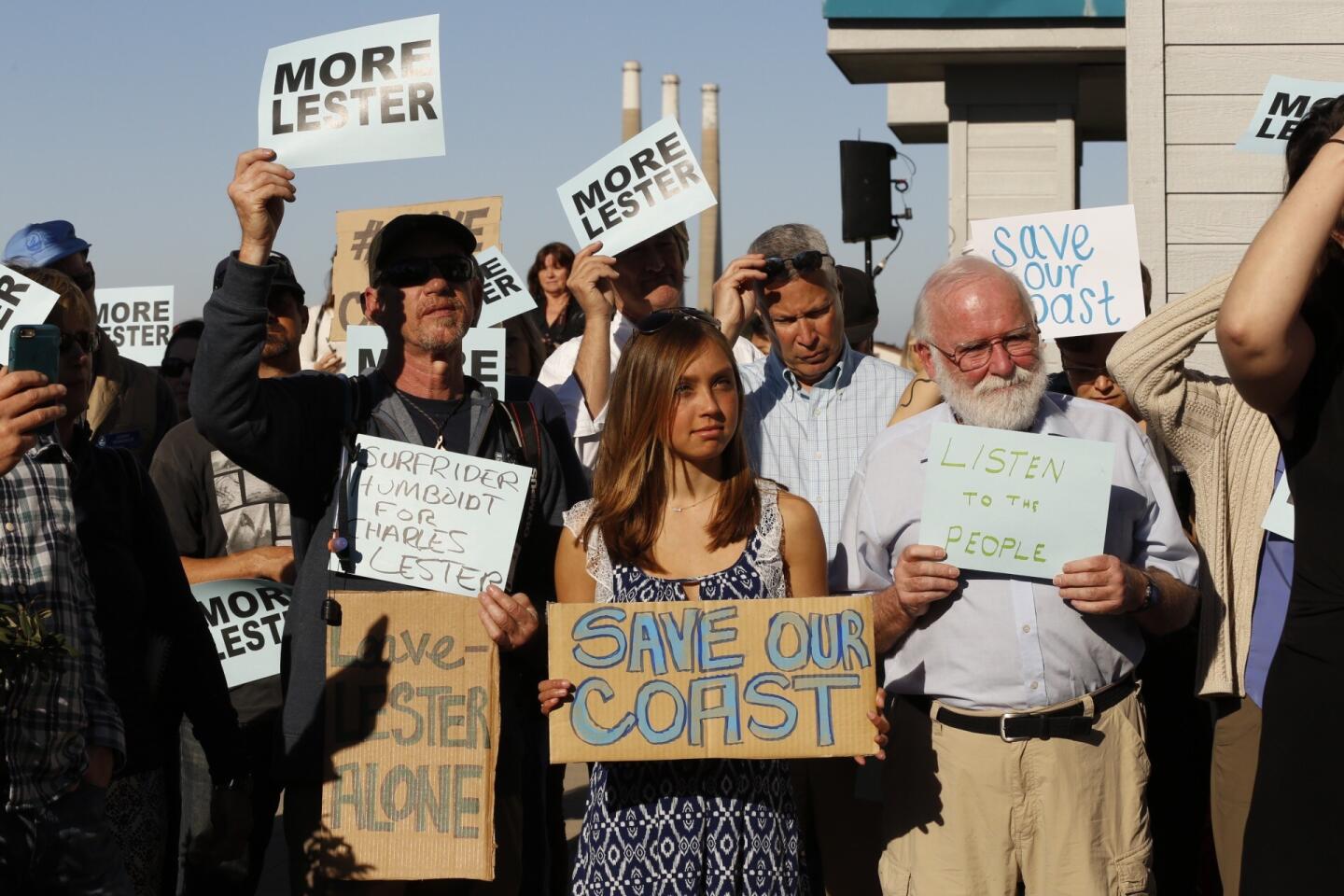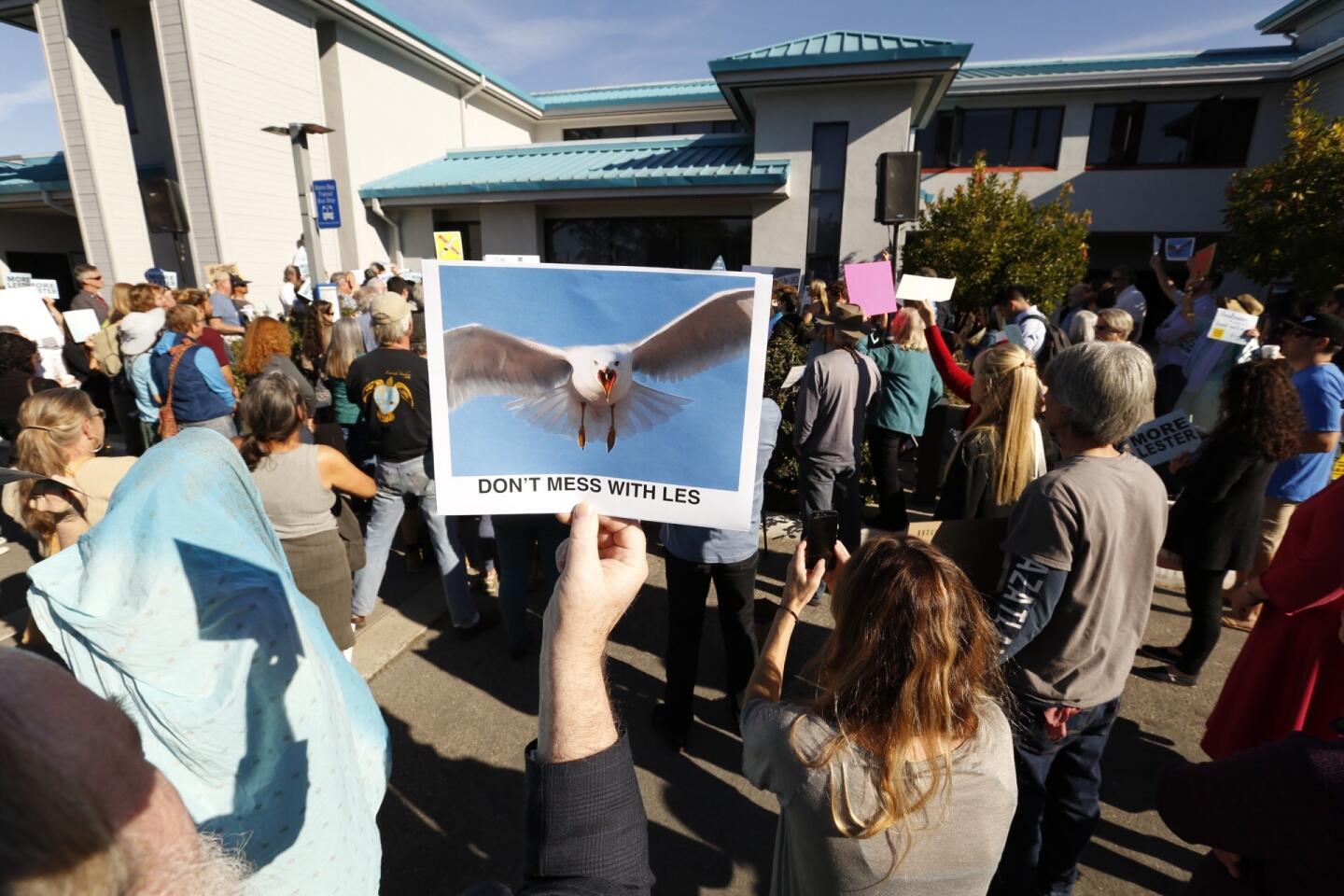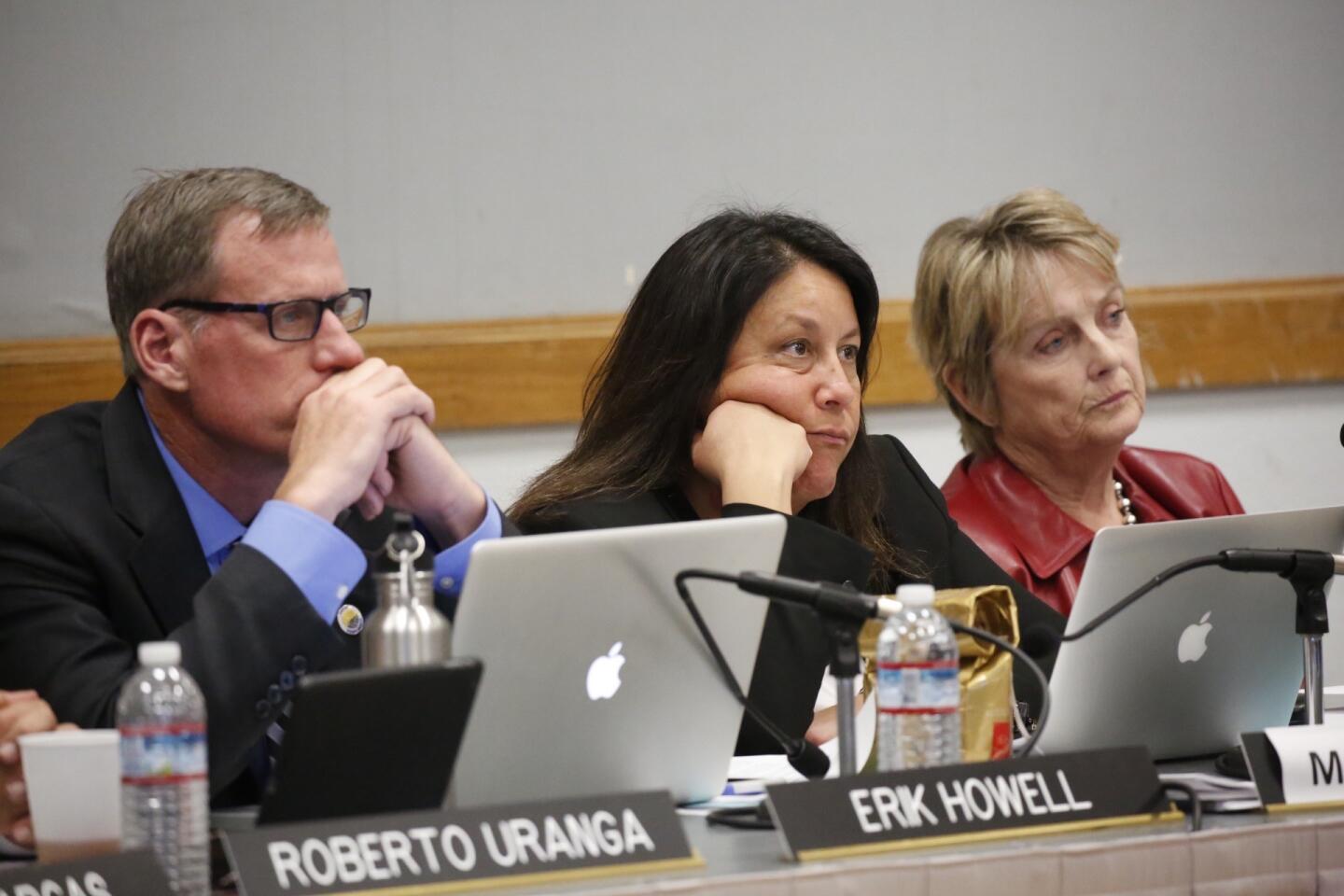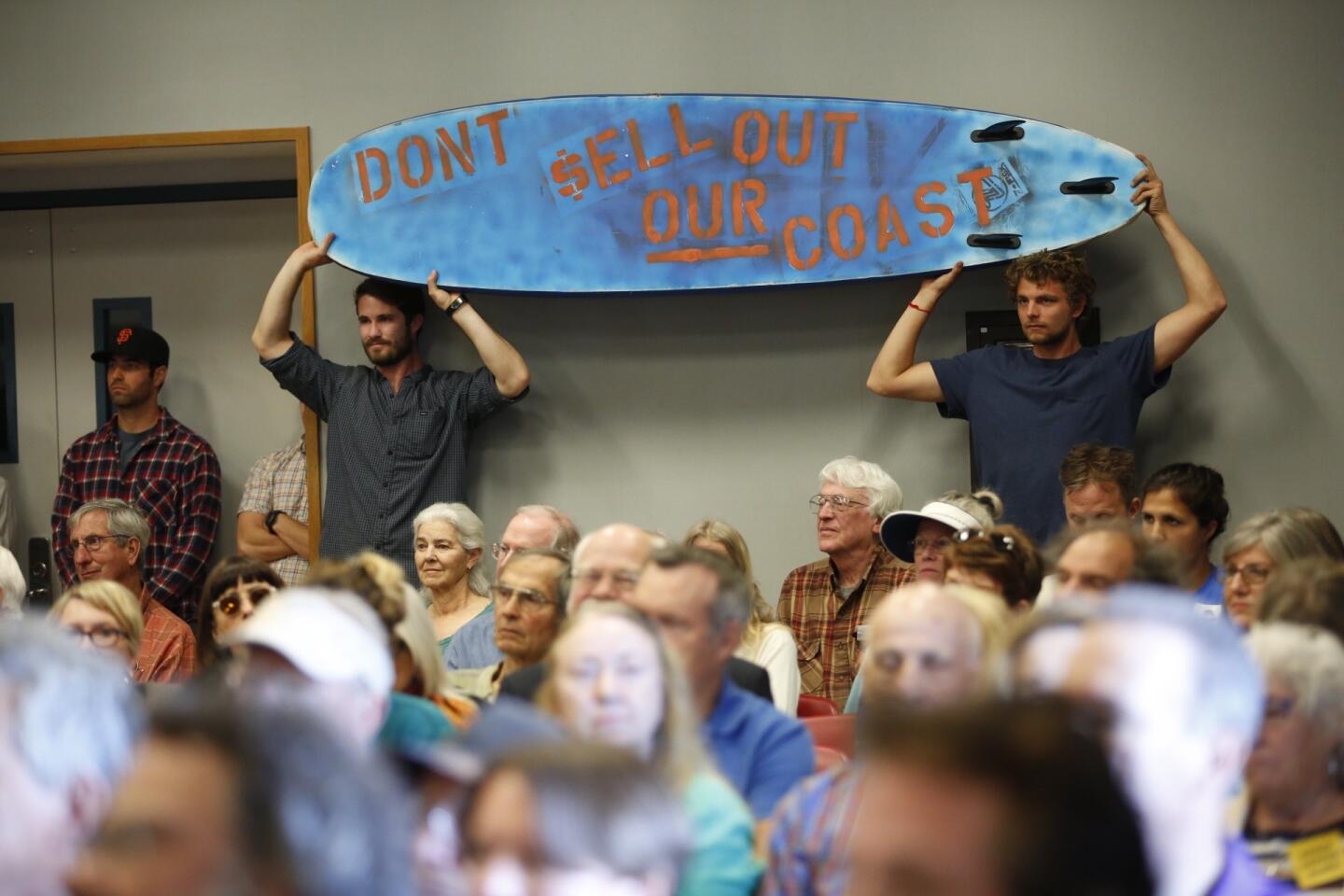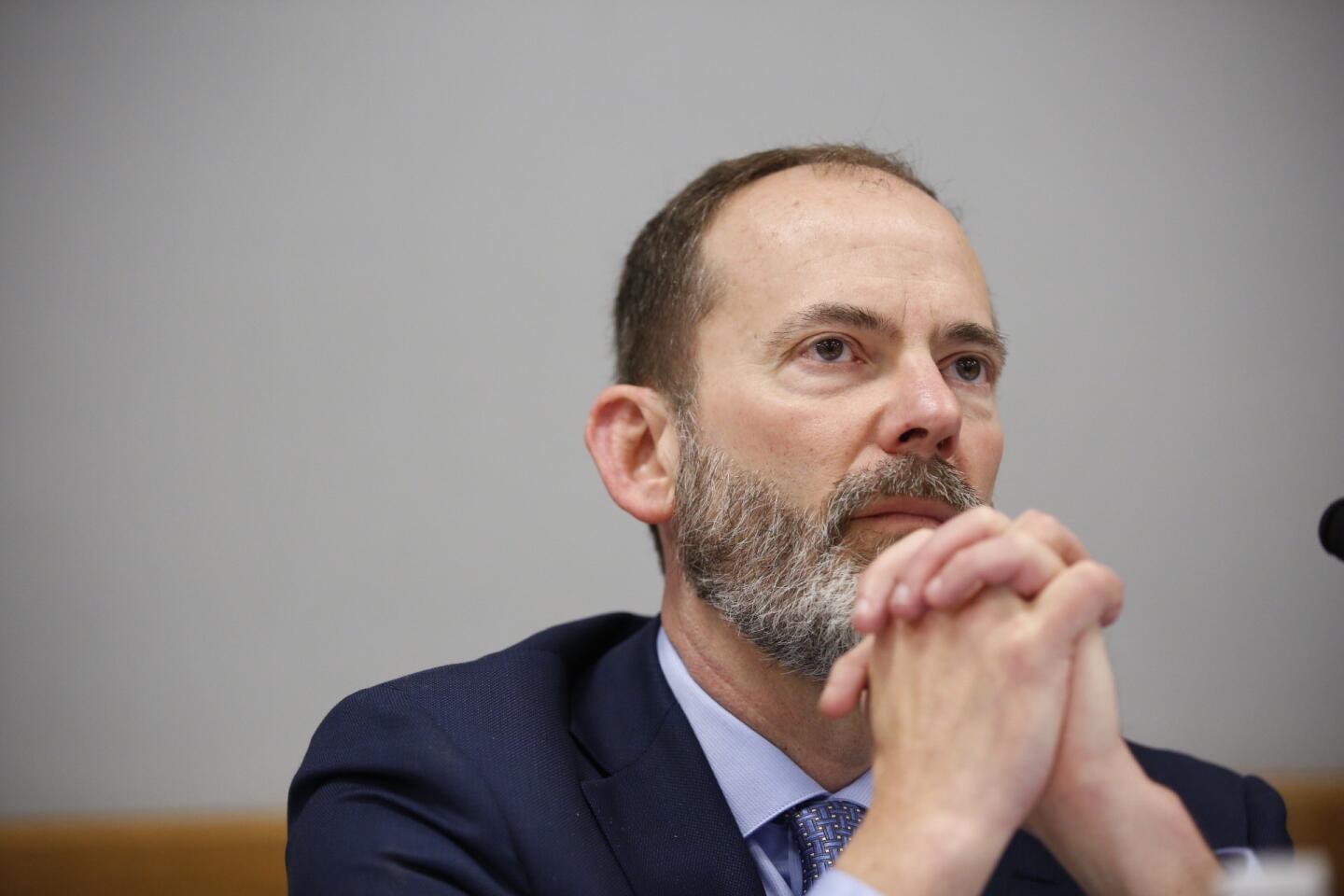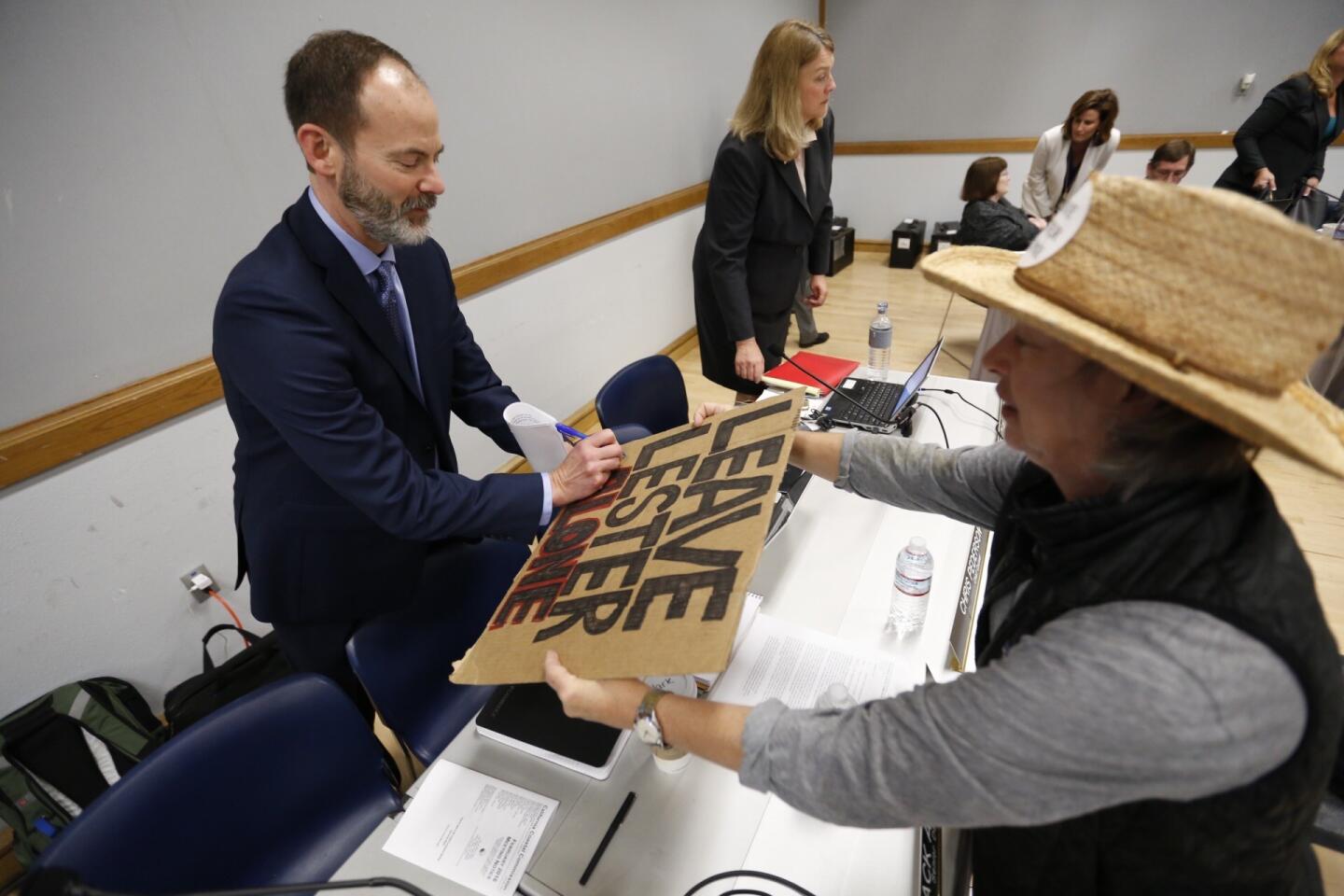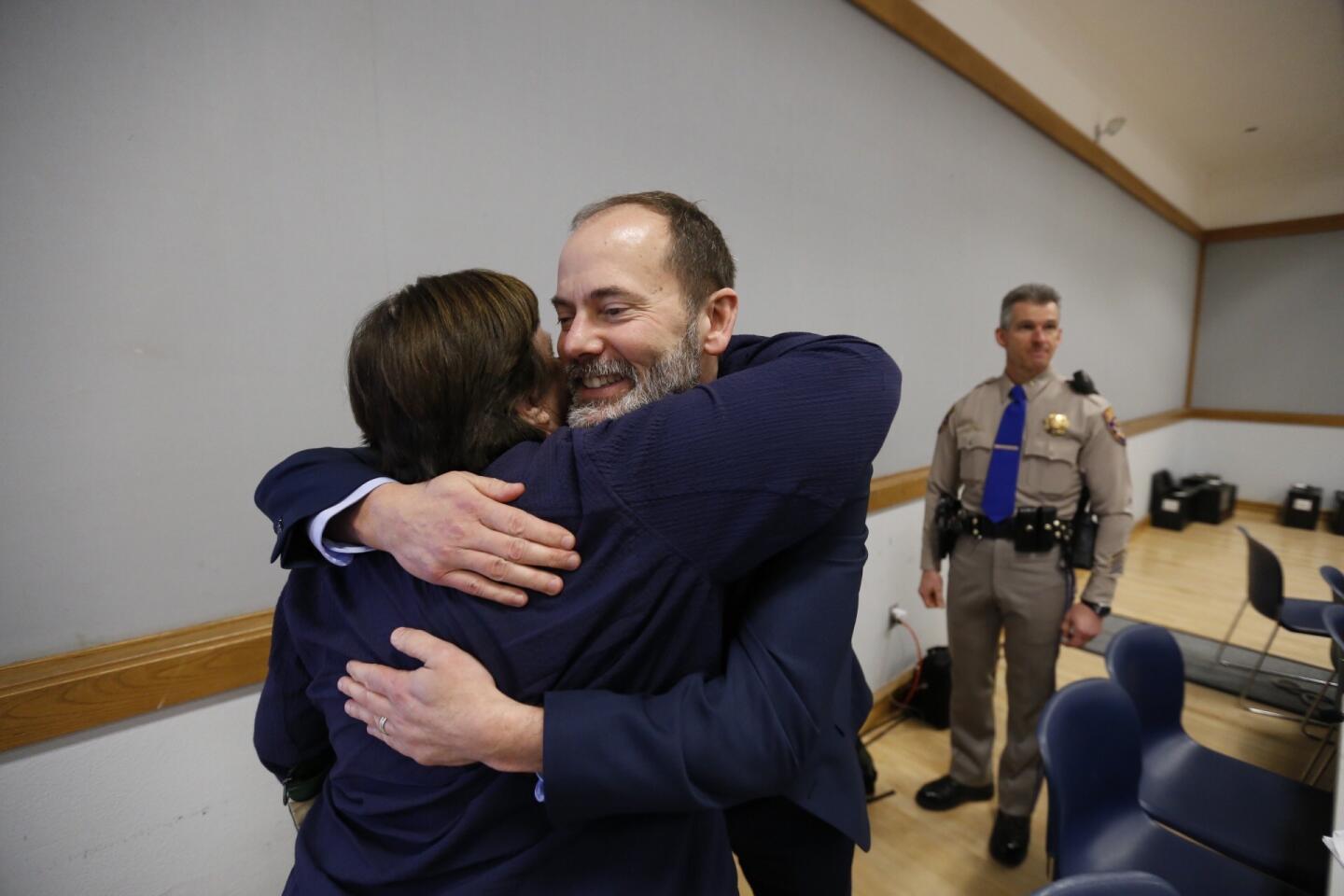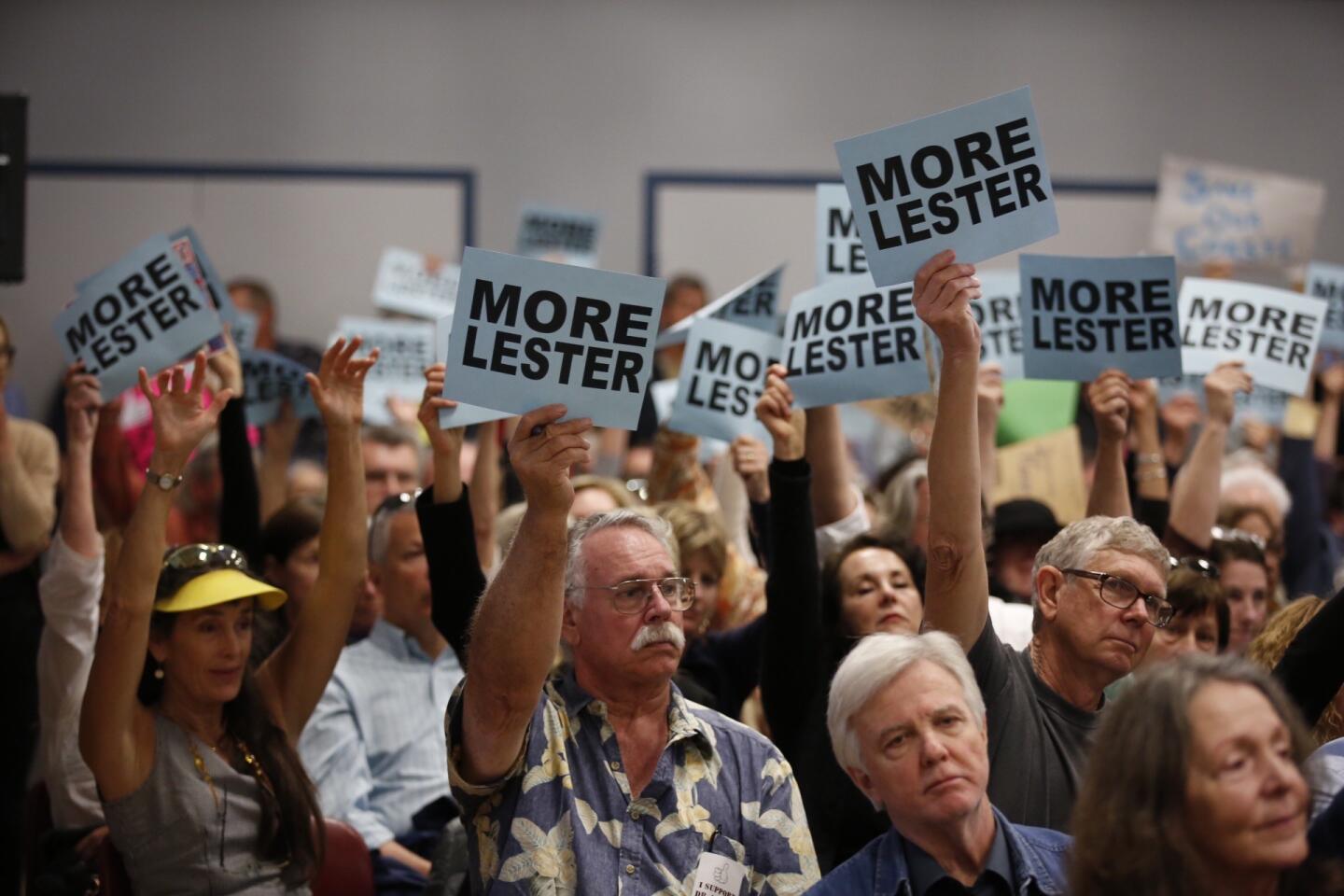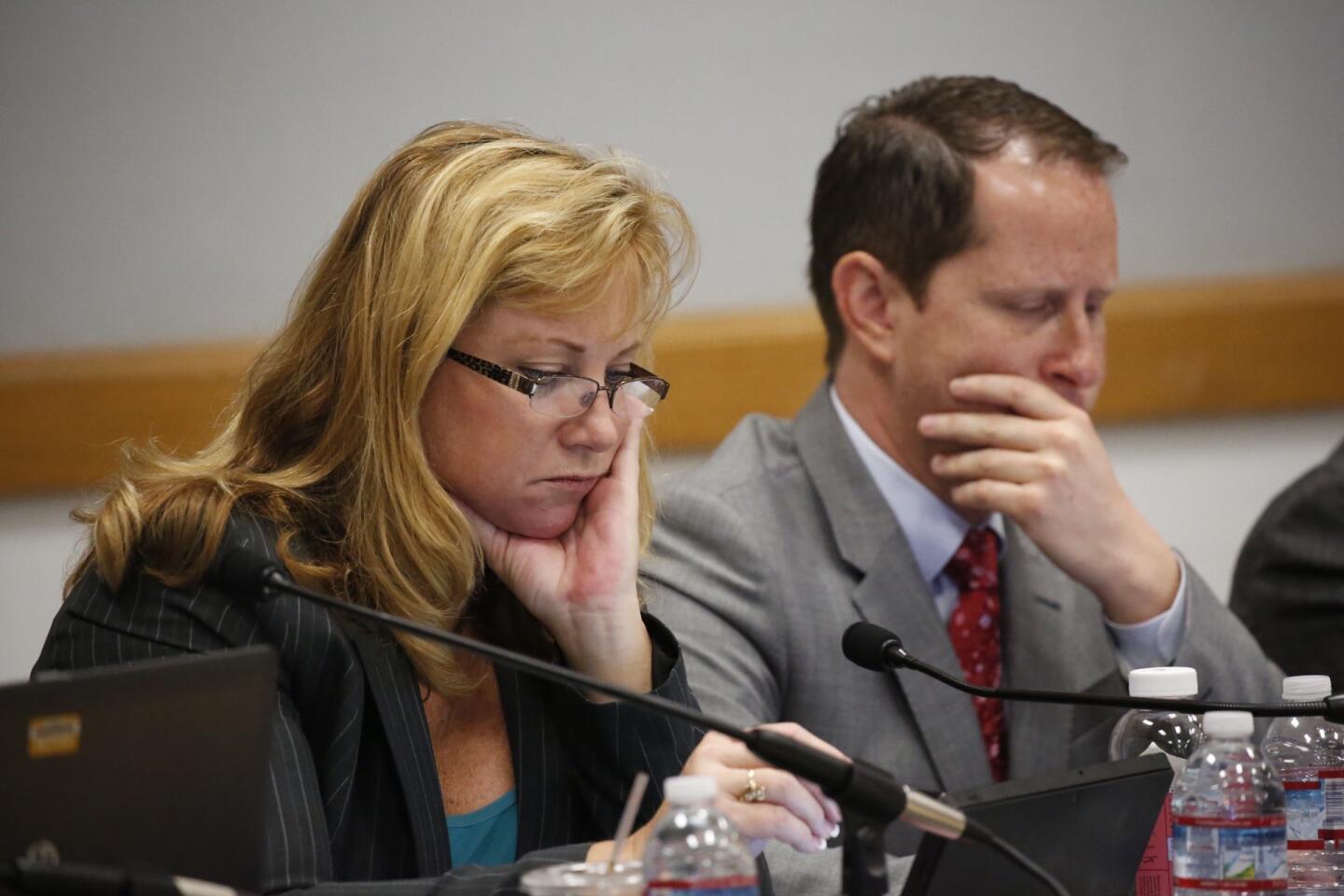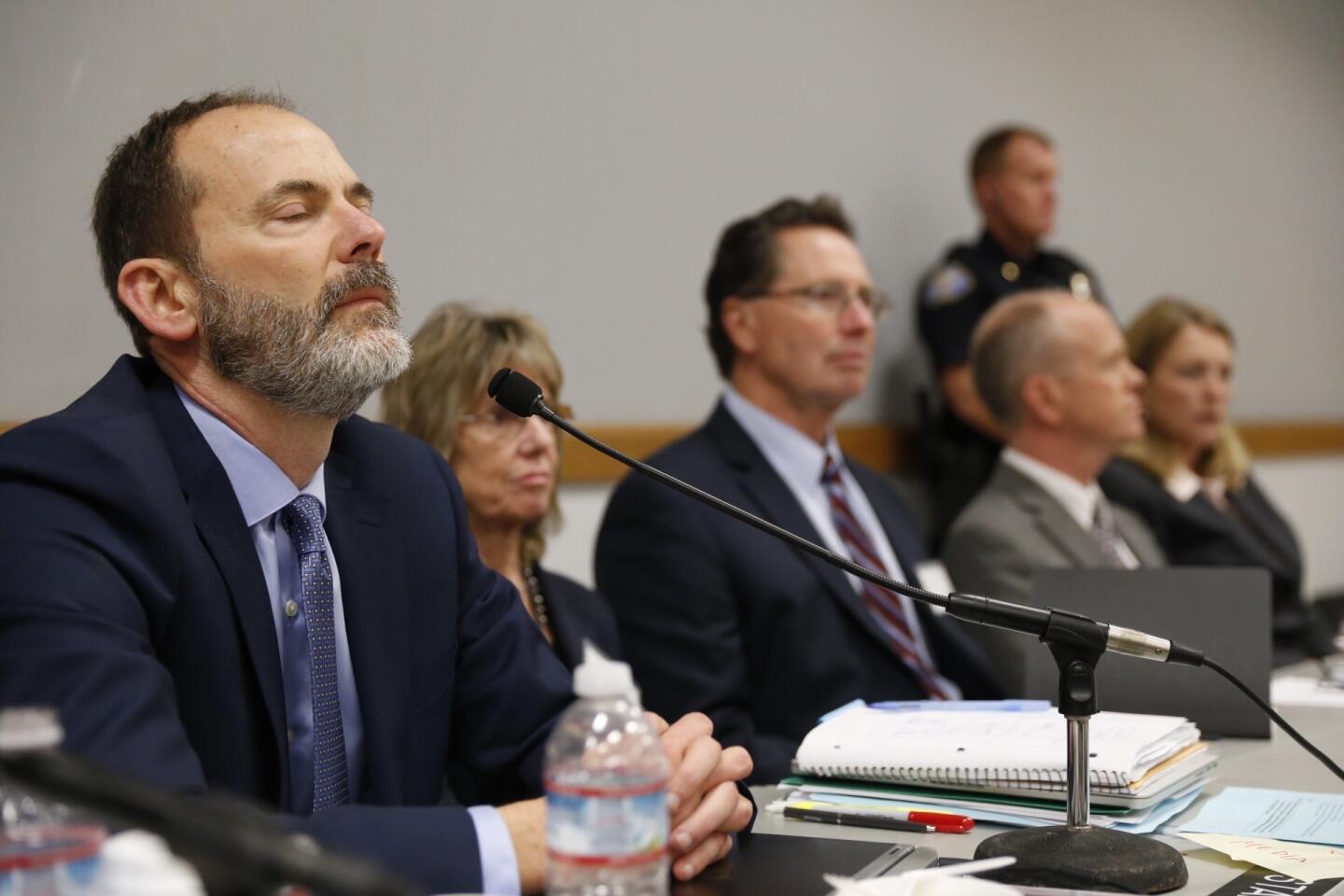‘Disgrace’ isn’t a strong enough word to describe Coastal Commission meeting
- Share via
If you’ve got a clothespin handy, you should clip it to your nose. I’m now going to tell you about the 12-hour California Coastal Commission meeting I sat through Wednesday in Morro Bay.
When the spectacle was over, members of one of the most powerful regulatory agencies in the country had racked up a number of accomplishments.
------------
FOR THE RECORD
An earlier version of this story misspelled the first name of Dayna Bochco as Dana and the last name of Robert Uranga as Uranaga.
------------
They fired their staff’s executive director, Charles Lester, who knows more about the 40-year-old voter-approved Coastal Act that protects our 1,100-mile shoreline than anyone in the world.
They devastated and demoralized the agency staff, so much so that some employees wept when the firing was announced.
They infuriated a who’s who of California’s longest-serving stewards of coastal preservation and access, along with hordes of public officials, current and former Coastal Commission staff, and former commissioners and citizens who had traveled from up and down the coast to speak glowingly of Lester’s integrity and diligence.
They accused the media of building a bogus narrative about why Lester’s job was in jeopardy, falsely insisting they were not at liberty to discuss their complaints about his performance in public.
And they spoke of their commitment to accountability and transparency, then refused to conduct their business in public, retreated into privacy, papered over the window and dropped the guillotine on Lester in a 7-5 vote.
“Disgraceful,” Susan Jordan of the California Coastal Protection Network told me, even as staffers sobbed and embraced a stricken Lester.
Among the many outrages, before the vote, was bellyaching from some commissioners about the fact that they are in unpaid posts that require a lot of work.
Boo-hoo.
First of all, no one forced them to take these appointments from the governor and leaders of the state Senate and Assembly.
Second, there are different ways to get paid, such as when the all-powerful coastal lobby chuck wagon rolls around to campaign fundraisers for commissioners who also serve as local public officials.
More carping came from Commissioner Martha McClure, who whined that Lester’s staff hadn’t provided information about the agency’s budget. I guess she didn’t think to look on the agency’s website, where it’s been posted since last month.
And Olga Diaz of Escondido, a stand-in for an absent San Diego County commissioner, hasn’t been around long enough to build a sand castle. But in what many saw as a key swing vote, Diaz buried Lester, who had been on the staff for nearly 20 years.
Lester never claimed he was perfect, admitting at the meeting that there was room for improvement. But in a plea for his job, he argued that he had responded to commissioner criticisms of his leadership.
He took some heat for not waiving his right of privacy and allowing the release of his performance reviews, but as he explains it, he was protecting the privacy of staffers who were criticized in those same reports.
“Disgrace” is not a strong enough word for what I witnessed in Morro Bay.
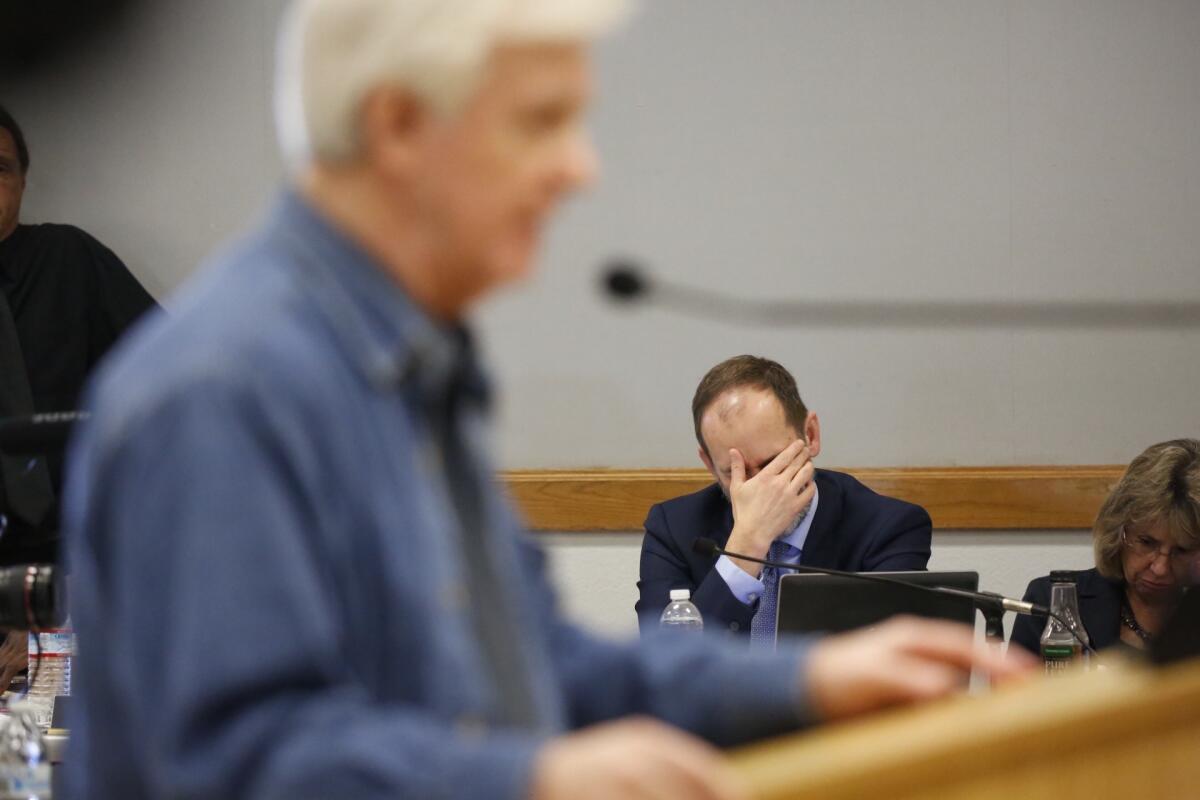
Charles Lester reacts to speakers during a long commission hearing on a vote for his dismissal.
This was such an embarrassment that state Assembly Speaker Toni Atkins (D-San Diego) tweeted an apology saying she thought “my appointees would be better stewards of the coast.”
At times during the meeting, Commissioners Wendy Mitchell and Dayna Bochco gabbed like school kids on the dais, and they cast seventh-grade smirks at press row when colleagues took turns bashing the news media.
If California’s media deserve a beating, in their diminished state, it’s for not keeping a close enough watch on this all-powerful agency and the constant pressure applied by hired guns for billions of dollars’ worth of development projects.
Commissioners must have had a talking points session before the meeting, because one after another they parroted the same line about how the journalists covering this fiasco adopted a “white hat-black hat” take on the commission, making it appear as if commissioners were about to bulldoze the entire coast.
Balderdash.
I don’t believe that’s a risk because the Coastal Act prevents the raping of the coast.
What I do believe — as do dozens of commission staffers, current and former commissioners and watchdogs — is that a disturbing shift is at play in the division of labor and power between the commissioners and the commission staff. And that shift benefited property owners rather than the public.
“This was about the commission trying to take more control of the process,” said Lester, who figures he was too independent for the tastes of some commissioners.
He said he believes that his first duty was an allegiance to the letter and spirit of the Coastal Act, even as he felt pressure from commissioners to move development projects forward more quickly.
And that allegiance should always reign supreme, whether we’re talking about a desalination project in Huntington Beach, a residential development in Seal Beach, or the massive Banning Ranch development still alive in Newport Beach despite a Lester recommendation against plundering the environmentally sensitive habitat there.
“Banning Ranch should take a very long time because it’s a huge project and it does impact the coast, no doubt about it,” said Commissioner Carole Groom, who voted to keep Lester, as did Commissioners Mary Luevano, Mary Shallenberger, Steve Kinsey and Bochco.
Groom had suggested the commissioners debate Lester’s fate in public, and Lester had given his consent to such a proceeding.
Her motion was crushed.
In one of the hearing’s more cinematic moments, Shell Beach residents Ed and Chris Henry took turns ripping into Commissioner Erik Howell.
The Henrys testified that they had met with Howell, a Pismo Beach councilman, to voice concerns about a proposed residential development that would restrict bay views from the Coast Highway. The Henrys said Howell told them the staff’s recommended restrictions on the project were “dead on arrival,” because the developer was represented by Susan McCabe.
McCabe, if you’ve misplaced your score card, once boasted in emails about “spoon feeding” a commissioner while attempting to secure his vote on a controversial project in San Diego.
Ed Henry said Howell “gushed that [McCabe] was so powerful and connected ... she was the only person who could walk into the governor’s office without an appointment and be received.”
The Henrys traveled to Half Moon Bay last November for the commission vote on the project, and they said they and several neighbors were shocked by what they saw at a posh restaurant on the eve of the hearing.
Breaking bread together were Howell, McCabe and the developer.
“It’s very disturbing” to see such a blatant example of this cozy culture, said Chris Henry, “the night before they set out to vote on a project.”
The next day the recommended restrictions on the development were defeated, 6 to 5, with Howell casing one of the six votes.
“Erik Howell, you should be ashamed of yourself,” Ed Henry said at Wednesday’s meeting.
Howell sat there at the commissioners’ table, tight as a Pismo clam. I don’t think he blinked.
Nor did he respond to my subsequent requests for an interview.
McCabe sent an email saying no thanks.
By the way, Gov. Jerry Brown’s office insists that the governor had nothing to do with the Lester body dump, and Brown had no comment in the days before or after the hearing.
It should be noted, however, that all four of Brown’s appointees to the commission — Howell, Effie Turnbull-Sanders, McClure and Mitchell — voted to sack Lester. So did Commissioners Roberto Uranga and Mark Vargas.
And speaking of Vargas, this Los Angeles-based businessman seems to have trouble returning phone calls. So I thought I might be able to corner him at Wednesday’s hearing.
I had a few questions about the five-mansion Malibu compound that David Evans — a.k.a. U2’s the Edge — managed to get approved in mid-December after years of high-powered lobbying. By then, the project had been scaled back and recommended for approval by staff despite lingering opposition on many fronts, with the Sierra Club suing to put a stop to it.
My question for Vargas is why, a few weeks before unanimous approval of the project, did he happen to meet with Evans in Dublin, Ireland?
Agency rules require “a complete, comprehensive” account of such meetings.
But when I saw the document filed by Vargas, the word “comprehensive” did not come to mind.
Vargas gave only a two-sentence explanation of his meeting. He wrote that the ever-busy go-between Susan McCabe had set up the meeting between Vargas, Evans and Evans’ wife, and that the applicants told Vargas they believed they had addressed commission concerns about the Malibu proposal.
OK, fine. But why Dublin? Did Vargas catch a U2 concert while he was there? Did he pay all his own expenses?
Fair questions, right?
I followed Vargas out of the meeting Wednesday during the lunch break and shadowed him, asking a half-dozen times if he’d answer my questions.
He didn’t acknowledge me.
I tried again later when he dashed off for a break.
He ignored me.
Join the conversation on Facebook >>
Later, from the dais, Vargas joined colleagues in bashing the media, and also had this to say:
“Transparency and accountability are important to me.”
Vargas then marched into secret session, ignored the pleas from hundreds of committed stewards of California’s greatest natural wonder, and lodged one of the votes that cost Charles Lester his job.
Twitter: @LATstevelopez
MORE ON THE CALIFORNIA COASTAL COMMISSION
Editorial: Coastal Commission needs more scrutiny in the wake of dubious firing
Coastal chief’s ouster prompts bill to require transparency between lobbyists and panel
Coastal Commission, an agency with populist roots, takes heat over secret-session firing of director
More to Read
Sign up for Essential California
The most important California stories and recommendations in your inbox every morning.
You may occasionally receive promotional content from the Los Angeles Times.
